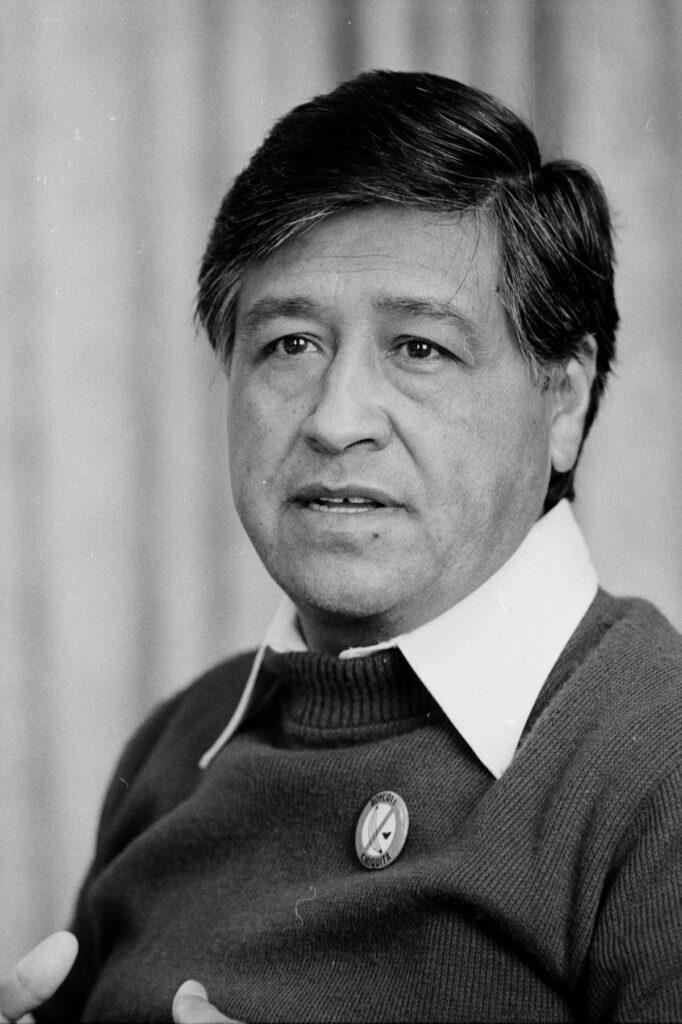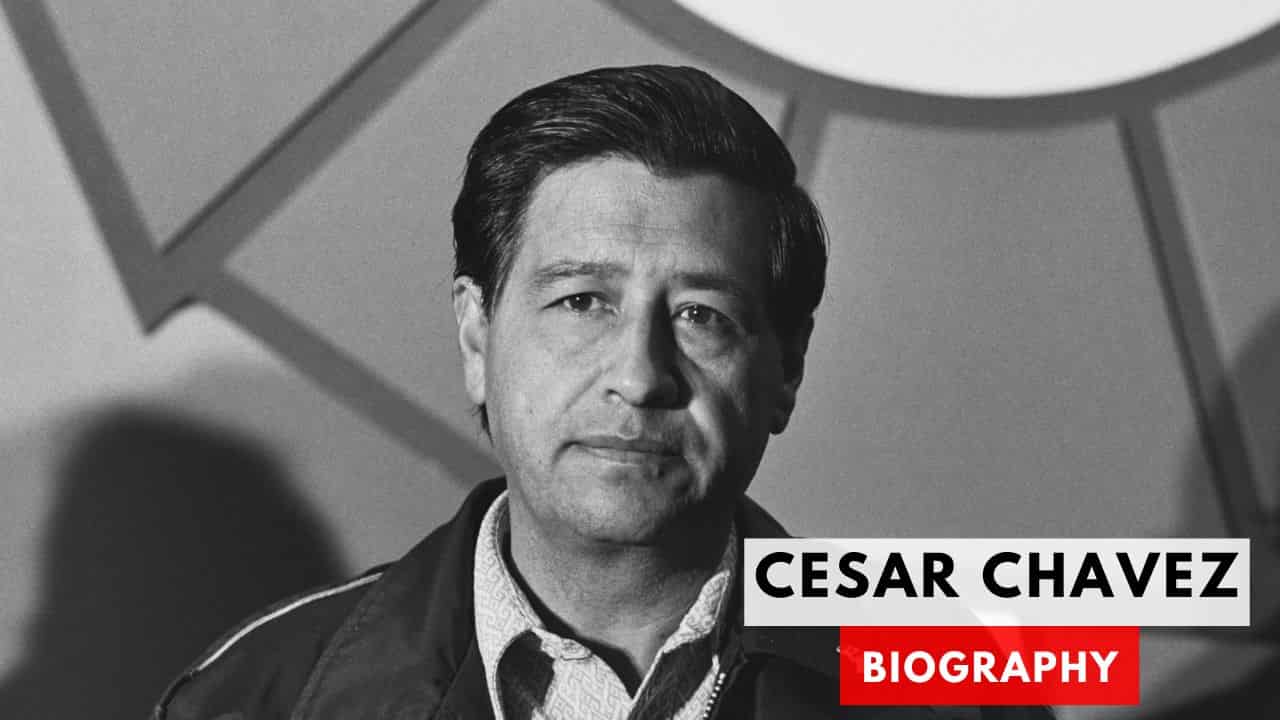Cesar Chavez Ethnicity, Wikipedia, Wiki, Hometown, Profession, Quotes, Death
Cesar Chavez Ethnicity, Wikipedia, Wiki, Hometown, Profession, Quotes, Death –
Cesar Chavez, born on March 31, 1927, in Yuma, Arizona, was a prominent American labor leader and civil rights activist. He dedicated his life to fighting for the rights and better living conditions of agricultural workers, leaving behind a lasting legacy of social justice and labor activism.
Cesar Chavez Early Life and Education
Cesar Chavez’s early life was marked by the challenges faced by his immigrant family during the Great Depression. At the age of 10, his paternal grandmother’s farmstead was auctioned off by the local government against his father’s wishes, leading the Chavez family to move to California to work as farm laborers. This experience exposed young Cesar to the injustices that existed in the world, laying the foundation for his future activism.

After changing schools multiple times due to his family’s constant relocations for work, Chavez left school at the age of 15 to support his family. He joined the United States Navy in 1944 and served until 1946, after which he returned to farm work. It was in 1947 that he became actively involved in activism, joining the National Farm Labor Union and participating in strikes and pickets against unfair labor practices.
| Full Name: | Cesario Estrada Chávez |
|---|---|
| Nickname: | César |
| Birth Date: | March 31, 1927 |
| Death Date: | April 23, 1993 (aged 66) |
| Zodiac Sign: | Aries |
| Height: | Approximately 5 feet 6 inches (167 cm) |
| Ethnicity: | Mexican-American |
| Nationality: | American |
Cesar Chavez Height and Weight
Cesar Chavez stood at a height of approximately 5 feet 6 inches (167 cm). However, specific details about his weight are not readily available in public records. Chavez’s physical stature, while not imposing in a traditional sense, did not diminish the immense impact he had as a labor leader and civil rights activist. His influence was derived from his unwavering dedication and the principles he upheld.
Cesar Chavez Personal Life
Cesar Chavez’s personal life was marked by his unwavering commitment to his cause. He declined offers, such as President John F. Kennedy’s proposal to head the Peace Corps for Latin America, to stay focused on his activism.
Chavez’s dedication to his work often meant personal sacrifices, including frequent relocations during his childhood and the challenges of organizing and leading labor movements. His commitment to the welfare of farmworkers and their families was unwavering.
Cesar Chavez Family Life
Cesar Chavez was the son of Librado and Juana Estrada Chávez. His parents were themselves children of immigrants. Chavez’s upbringing was marked by the economic challenges faced by his family during the Great Depression, which ultimately led to their relocation to California, where they became farm laborers. He was deeply influenced by the struggles his family and other farmworkers faced, which later became a driving force behind his activism.
Chavez’s commitment to improving the lives of agricultural workers was rooted in his own family’s experiences, and he worked tirelessly to ensure that others did not endure the same hardships.
Cesar Chavez Relationships
One of the most significant relationships in Cesar Chavez’s life was his partnership with Dolores Huerta. Dolores Huerta, a fellow activist, and organizer, played a pivotal role in Chavez’s efforts to establish and lead the United Farm Workers union. Their collaboration was instrumental in the success of the grape strike and boycott, which garnered national attention and support.

While Cesar Chavez’s life was primarily dedicated to his activism and advocacy for farmworkers’ rights, his partnership with Dolores Huerta exemplified the power of collective action and shared commitment to social justice.
Cesar Chavez Ethnicity
Cesar Chavez’s ethnicity was Mexican. He was deeply connected to his Mexican heritage and identified strongly with the struggles of Mexican-American and Hispanic communities in the United States. Chavez’s advocacy for the rights of farmworkers, many of whom were of Mexican descent, was a reflection of his commitment to addressing the injustices faced by his own community.
Career in Activism
Chavez’s activism continued to grow in influence and scope. In 1952, he played a crucial role in establishing a chapter of the Community Service Organization (C.S.O.) in San Jose, California, and was soon elected as its vice president. His efforts aimed to increase job opportunities for Mexican-American workers and expand voter registration.
In 1959, Chavez became the national director of the C.S.O., where he led initiatives such as extending state pensions to permanent residents without citizenship. However, he resigned from this role in 1962 to pursue his vision of organizing agricultural workers more effectively.
Chavez, alongside fellow activist Dolores Huerta, founded the National Farm Workers Association (N.F.W.A.) in 1962. Chavez was elected as the general director and introduced important benefits for its members, including insurance policies and a credit union. This marked the beginning of significant changes for agricultural workers.
In 1965, the N.F.W.A. initiated its first strike, which successfully led to improved working conditions for rose grafters who had approached the organization for support. The organization later merged with the Agricultural Workers Organizing Committee to form the United Farm Workers Organizing Committee, which eventually became the United Farm Workers of America (U.F.W.).
One of the most notable moments in Chavez’s career was the grape strike and boycott that began in 1965. The U.F.W. led this campaign against California’s grape growers, gaining national attention and support through nonviolent resistance. The strike culminated in success in 1970, as farmworkers secured better wages and working conditions.
Throughout the 1970s, Chavez continued to lead strikes and boycotts, further improving labor contracts for farmworkers. In 1975, the state of California passed the Agricultural Labor Relations Act, a significant victory that allowed farm workers to unionize and negotiate for their rights.

In the 1980s, Chavez shifted his focus to the dangers of pesticides to farmworkers and their children, highlighting the need for safer working conditions in agriculture. He remained dedicated to improving the lives of agricultural workers until his passing in 1993.
Legacy and Impact
Cesar Chavez’s legacy extends far beyond his lifetime. He is remembered as a tireless advocate for social justice and labor rights, particularly for Hispanic and immigrant communities. His commitment to nonviolent activism and his famous slogan “Sí, se puede” (“Yes, we can do it”) continue to inspire individuals and movements worldwide.
Chavez’s work led to significant improvements in the lives of agricultural workers, securing better wages, safer working conditions, and the right to organize. His dedication to justice and equality made him a symbol of hope for marginalized communities, and he remains an iconic “folk saint” in the pantheon of Mexican Americans.
In recognition of his immense contributions, Cesar Chavez’s birthday, March 31st, is observed as a federal commemorative holiday known as Cesar Chavez Day in several states across the United States. He received numerous honors and accolades during his lifetime and posthumously, including the Presidential Medal of Freedom in 1994.
5 Surprising Facts About Cesar Chavez
- Inspiration for Obama’s Slogan: Cesar Chavez and Dolores Huerta coined the phrase “Sí, se Puede” (“Yes, we can do it”) in 1972, which President Barack Obama used as a rallying cry in his 2008 election campaign.
- Vegetarian Lifestyle: Chavez adopted a vegetarian lifestyle, citing his realization that animals also felt fear, cold, hunger, and unhappiness as the reason for giving up meat.
- Declined Presidential Offer: President John F. Kennedy offered Chavez the position of heading the Peace Corps for Latin America, but he turned it down to continue his activism.
- Many School Transfers: Chavez attended a total of 38 different schools during his childhood due to his family’s frequent moves in search of work.
- Cesar Chavez Film: In 2014, a biographical film titled “Cesar Chavez” was released, highlighting his life and contributions to social justice and labor activism.
Also Read,
- Linda Ronstadt Ethnicity, Illness, Heritage, Wikipedia, Parents, Age, Net Worth, Young
- Luisa Moreno Wikipedia, Wiki, Age, History, Quotes, Biography
- Zach Wilson Girlfriend Now, Ex Fiance, College Team, Stats Last Night, Wife, Instagram, Net Worth
Why was Cesar Chavez so famous?
Cesar Chavez became famous for his leadership in the labor and civil rights movements, particularly for his role in advocating for the rights of agricultural workers. For over three decades, he led the first successful farm workers’ union in American history, the United Farm Workers (UFW). Chavez’s fame stemmed from his tireless efforts to secure dignity, respect, fair wages, medical coverage, pension benefits, humane living conditions, and numerous other rights and protections for hundreds of thousands of farm workers. He used nonviolent tactics and grassroots organizing to raise awareness about the plight of farm laborers and garnered nationwide support for their cause.
When did Cesar Chavez died and why?
Cesar Chavez passed away on April 23, 1993, at the age of 66. He died unexpectedly in his sleep of natural causes. His death was a significant loss to the labor and civil rights movements, but his legacy and the impact of his work continued to inspire others to advocate for social justice and workers’ rights.
What did Cesar Chavez died of?
Cesar Chavez died of natural causes. After a lifetime dedicated to advocating for social justice and improving the lives of farm workers, he passed away peacefully in his sleep in 1993. His contributions to labor rights and civil rights continue to be celebrated and remembered to this day, and he posthumously received the Presidential Medal of Freedom in 1994 for his remarkable achievements.








